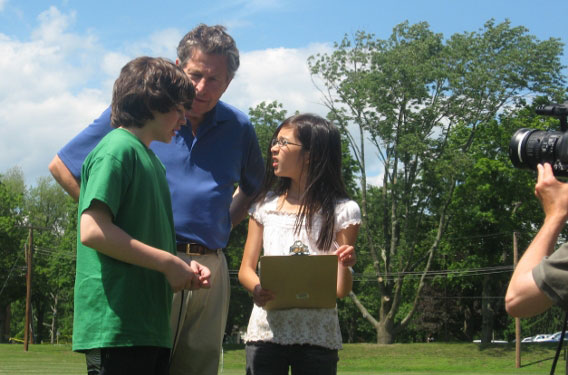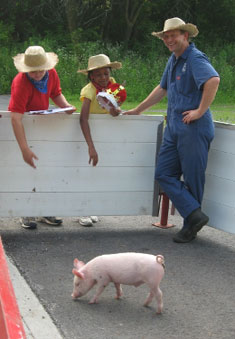Four-Legged Brainiacs
When the PBS kids’ show Fetch! with Ruff Ruffman came to the Cummings School to find out which animals are smartest, all bets were off
By Catherine O’Neill Grace
The scientific method is alive and well at the Cummings School of Veterinary Medicine. In every department, students and faculty engage in rigorous research as well as teaching and learning. And when the crew from the PBS children’s TV show Fetch! with Ruff Ruffman came to town, the scientific method moved into the dog-walking field and the swine barn.

Professor Nicholas Dodman with two FETCHers, Isaac and Talia, during filming at the Cummings School. Photo: Courtesy of WGBH/Fetch! with Ruff Ruffman
Ruff Ruffman is a cartoon dog who interacts with real children and animals on the National Science Foundation-funded show, which is produced by WGBH Boston. Targeting six- to ten-year-olds, the show sends its cast of “tweens” out to do all kinds of more-or-less scientific projects to earn points. Their investigations may be statistically insignificant, but they’re pedagogically sound.
The contestants, called “FETCHers,” have fun while learning problem-solving skills and teamwork. The series focuses on real-world science, featuring kids as they pursue questions, conduct experiments and actively investigate the world around them. The activities done at Cummings were what its producers term “data challenges,” which invite the young contestants to collect and analyze data to answer a question.
Two episodes were filmed on the Grafton campus. With faculty well-versed in veterinary medicine and a campus that features a working farm, the Cummings School became an ideal backdrop for the program’s team of young scientists as they followed the scientific process to solve a problem.
FETCHers spoke with Nicholas H. Dodman, director of the Animal Behavior Program, and Lara A. Weaver, V00, Interim Director of the Division of Teaching and Research Resources, for help in determining canine intelligence, and then turned to swine herdsman Garth Miller to meet some of the school’s pigs. Local dog owners—including users of the school’s Farm Field—brought dogs ranging from Afghan hounds to a wire fox terrier to determine which breed of dog is the smartest. The winning pooch was then matched up against one of the Cummings School’s pigs in a battle of wits.

One of the contestants—the piglet named Rondo—with FETCHers Brian and Bethany and Cummings swine herdsman Garth Miller. Photo: Courtesy of WGBH/Fetch! with Ruff Ruffman
For the canine-intelligence experiment, Dodman helped the FETCHers design tests and run the group of dogs through them. “You need to learn so you won’t make the same mistakes over and over again,” Dodman told the FETCHers. One test involved throwing a sheet over each dog to see how long it took to shake off the cloth, then repeating the process to see if it learned to get out faster. Other tests challenged the dogs to locate hidden treats quickly. The winner? Kylie, a border collie—paws-down.
Kylie makes a second appearance on another episode of the show, “Ruff Pigs Out and Has a Whale of a Time,” which airs nationally on PBS on Thursday, October 22—check your local listings for exact times. For this episode, swine herdsman Miller helped the FETCHers set up mazes to see which animal—border collie Kylie or a comely Cummings piglet named Rondo—learned faster. Each animal ran three mazes of increasing complexity to reach a treat at the end.
So who won? You can tune in on October 22 to find out or—spoiler alert!—read on.
And the winner was… Rondo the piglet! As the two animals ran the maze, the border collie moved more slowly each time, while the pig got faster. Miller wasn’t surprised. Pigs are indeed smarter than dogs. “Experts say they’re as smart as a three-year-old child,” the herdsman said.
For program information about Fetch! with Ruff Ruffman, as well as additional games and activities to try, go to http://pbskids.org/fetch/
Catherine O’Neill Grace, editor of Tufts Veterinary Medicine magazine, can be reached at catherine.grace@tufts.edu.

